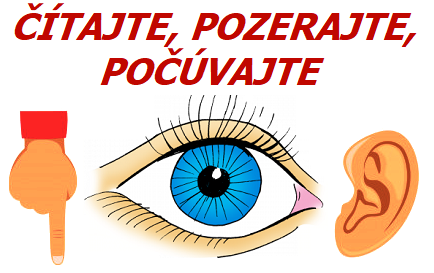14 Komunikácia a jej formy - COMMUNICATION AND ITS FORMS :)
Vytvorené: 27. 02. 2014 Tlačiť
a) Forms of communication and its meaning
Communication is the way how people express their feelings and opinions. People can communicate in different ways. Verbal communication includes sounds, words, speaking and language. More than 3,000 languages and major dialects are spoken in the world today. People usually communicate face-to-face and put different meanings into words. We can make promises, explain, persuade and tell lies or truth. There is also written communication where people write letters, e-mails, postcards or notes. Written communication allows more time and planning therefore the vocabulary of a written text is more complicated and better organised. We have the possibility to read our ideas, change or correct them. On the other hand, the writer can´t support his emotions by stress or intonation. The non- verbal communication consists of gestures and mimics. Our feelings can be shown through facial expressions. These include raising eyebrows, yawning, sneering, rolling eyes, gaping, and nodding. Eye contact is very important in communicating nonverbally. You can read a person’s emotion through their eyes, and many times is not the same emotion as their words are saying. To give an example, we could mention our smile that expresses happiness or good mood. Gestures are considered to be movements of hands, body and head. Examples of non verbal communication of this type involve shaking hands, patting the back, hugging, pushing, or other kinds of touch. . Some people who are handicapped like deaf and dumb use gesture language. There is Brails script for blind people.
b) Communication in different situations
Formal communication is used among people who don´t know each other, for example in offices, at school or in public. People are more polite and create longer sentences. It is for example the communication between a shop assistant and a customer or between a teacher and a student. Informal communication is used among people who know each other very well - among schoolmates, members of a family, friends and colleagues. They prefer different idioms. The most popular topics of communication are weather, everyday life, problems, money, art, sport and politics. We are looking for different words in different situations. People in emergencies use expert words which are connected to their branch.
c) Modern forms of communication
The development of science and technology has brought new modern forms of communication. Today we live in a digital word and it´s necessary to use a computer and the internet. It enables us to communicate through e- mails. We can find friends all around the word and we can communicate in a foreign language. We can pay bills and we can do the shopping. And it´s very comfortable, because we can make it in one click This form of communication is rather impersonal and has stopped face-to-face contact.
It is good to have a mobile phone in case of emergency because you can call an ambulance or police immediately. On the other hand, some people use their mobile phone too much – they talk about their private matters on the bus or in the street and it can disturb other people. Therefore people should use their mobile phones only when they really need it.
d) Learning of foreign languages
Nowadays communication is becoming more and more essential because information moves the world. Learning of foreign languages belongs to everyday life and more and more people start to study languages such as English, German, French, Spanish or Russian. Foreign languages have become obligatory subjects for children even at primary schools.
The majority of people speak Chinese, but the most important language for the world communication is English. It is spoken by around 350 million people. It’s a language of business, technology, science, Internet, sport and culture, world politics. People start studying foreign languages for several reasons. Some people are very keen on travelling, others need a foreign language in their occupation because they want to get a well- paid job. People who often go abroad on business meetings cannot afford not to study any foreign languages. But people who work in research need knowledge in foreign languages too because there are lots of good quality books in foreign languages and only some of them have been translated into Slovak. Everybody has his own reasons for studying foreign languages. To sum up, it should be said that studying of foreign languages opens the gate to the world, new people, countries and it also gives a lot of opportunities how to improve and make our lives more effective, better and interesting.
e) Language
Standard language is a language supported by government recognition. It is a form of language used in schools and in public.
Dialect is a form of a language spoken in a particular geographical area or by members of a particular social class or occupational group, distinguished by its vocabulary, grammar, and pronunciation.
Slang is very informal type of language restricted to a particular context or group of people. The vocabulary is more metaphorical and very playful.
![]()
· Simulácie z fyziky· O Slovensku po slovensky· Slovenské kroje· Kurz národopisu· Diela maliarov· Kontrolné otázky, Domáce úlohy, E-testy - Priemysel· Odborné obrázkové slovníky· Poradňa žiadaného učiteľa· Rýchlokurz Angličtiny. Rozprávky (v mp3)· PREHĽADY (PRIBUDLO, ČO JE NOVÉ?)Seriály:· História sveta (1÷6)· História Slovenska (1÷5)· História módy (1÷5).
Členstvo na portáli
Poznámka pre autora
Copyright © 2013-2026 Wesline, s.r.o. Všetky práva vyhradené. Mapa stránky ako tabuľka | Kurzy | Prehľady |






